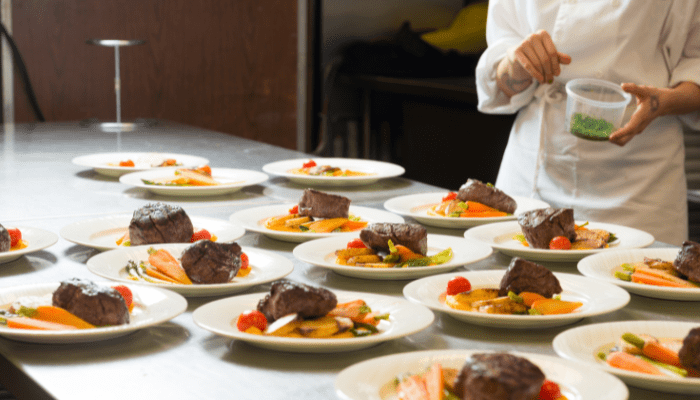When diners think of single-use packaging and food, they might think of a takeaway coffee cup or a package snack, as chefs we know that in the bustling kitchens of food service, plastic containers reign supreme, offering efficiency and convenience. And beneath their glossy exterior lies a troubling reality—one that demands our attention and collective action.
Imagine stepping into a professional kitchen, where sustainability and hygiene are paramount. Where single-use plastic containers are strictly prohibited, reflecting a commitment to responsible practices. However, as the era of food delivery platforms takes hold, restaurants find themselves at a crossroads – do we follow standard practice to take advantage of this market, or stick to our sustainable principles? Can we find a path that does both?
One dish, five containers
Consider the preparation of a simple pumpkin chicken risotto, in a kitchen that does use plastic containers:
- Chefs portion out half-cooked risotto into takeaway plastic containers
- …followed by the portions of chicken and pumpkin. It’s a dance of efficiency and portion control, aimed at minimising costs.
- It’s time for a delivery. The meal is prepared, then transferred into yet another plastic container.
- Add another, smaller container (or several) for toppings and condiments to ensure everything stays fresh and looks great when the customer puts it together
The result? A staggering five or more plastic containers for a single dish — a reality that raises serious questions about sustainability.
But what if we reuse our prep containers?
Many restaurants opt to reuse these disposable containers, a practice that, while cost-effective, raises concerns about food safety.
Picture entering a cool room in this modern era of food service, where the sight of hundreds of takeaway plastic containers greets you. Among them, repurposed plastic tubs—once home to yogurt or mayonnaise—now serving as vessels for hot stews and sauces. Over time, these containers change colour, warp, and deform, a visual testament to their repeated use and exposure to heat. It’s a sobering sight, prompting reflection on the long-term implications for both the planet and public health.
And what of the single-use ice cream tubs, their plastic bodies deformed from repeated microwaving? Imagine if your child was served their favourite spaghetti bolognese reheated in one of these deformed tubs. Would you let them eat it? It’s a question that underscores the risks posed by the widespread use of plastic in commercial kitchens, and asks if we’d truly be proud of what we were serving, if our patrons knew the whole picture.
Legislation & innovation – what needs to change
While initiatives like the Single Use Plastic Act in Queensland and Victoria aim to tackle
visible plastic waste (like shopping bags and straws), operational plastic remains largely unregulated. This gap in legislation allows for the continued use of plastic in commercial kitchens, perpetuating the cycle of waste and environmental harm.
Innovation offers a glimmer of hope. Companies like Green Panda are leading the charge with innovative solutions, like utensils made from recycled coffee grounds. These initiatives not only reduce plastic waste, but also inspire others to rethink their approach to sustainability.
Moreover, it’s crucial to address the excessive plastic in deliveries. Studies show that up to 80% of plastic in deliveries is avoidable. By implementing sustainable packaging solutions and reducing unnecessary plastic usage, businesses can significantly lessen their environmental footprint.
The plastic dilemma in food service calls for a comprehensive approach. By combining innovation, legislative action, and a commitment to sustainable practices, we can pave the way for a greener, healthier future. It’s time for the industry to come together and embrace change for the betterment of our planet and future generations.
Ready to reduce plastic-waste in your business? We can help you source sustainable products, find operational efficiencies and improvements to reduce the need altogether, or even just work with your team to find an easy place to start on your first few substitutions. Get in touch for a free consultation on our sustainable hospitality services.

